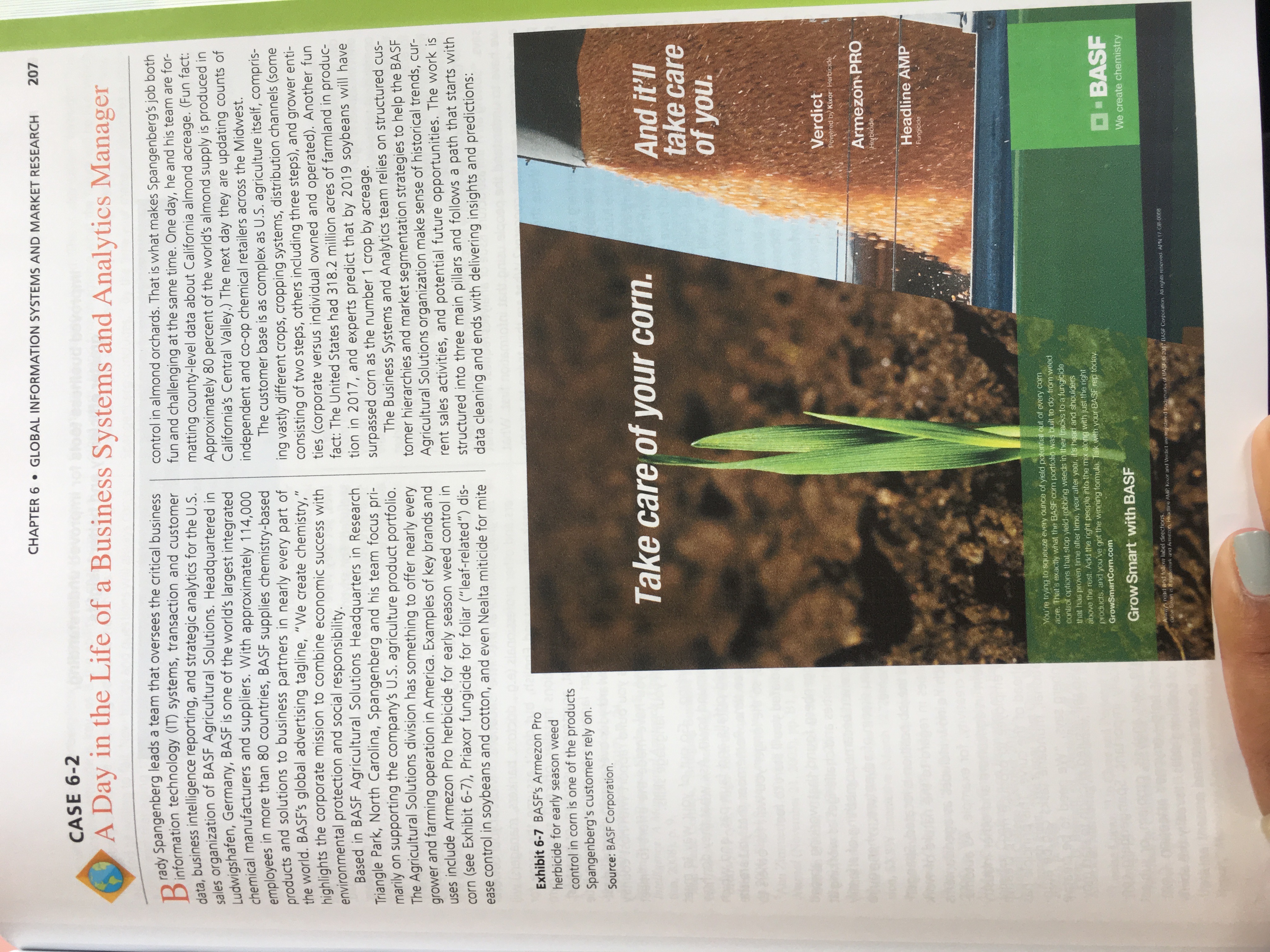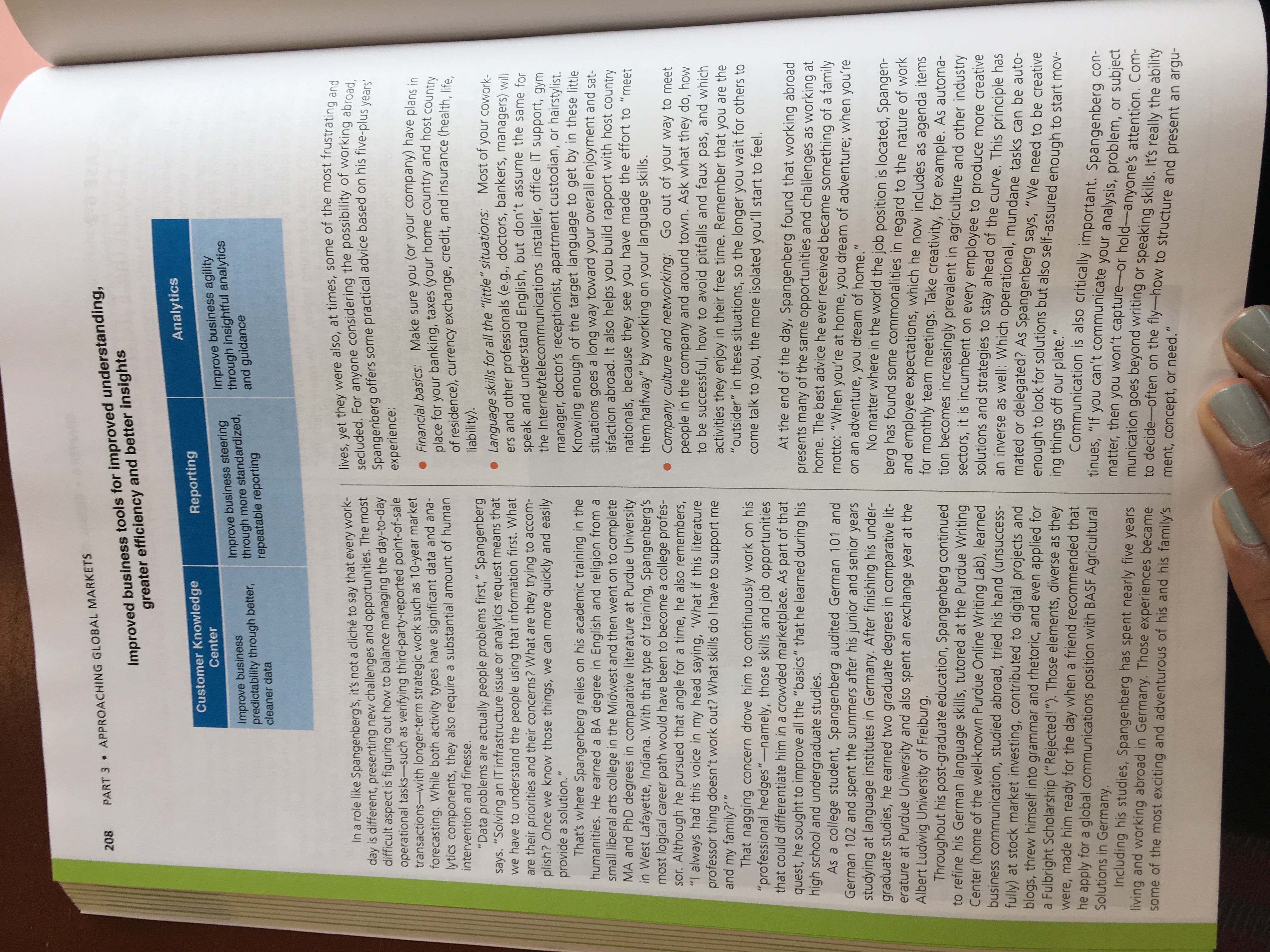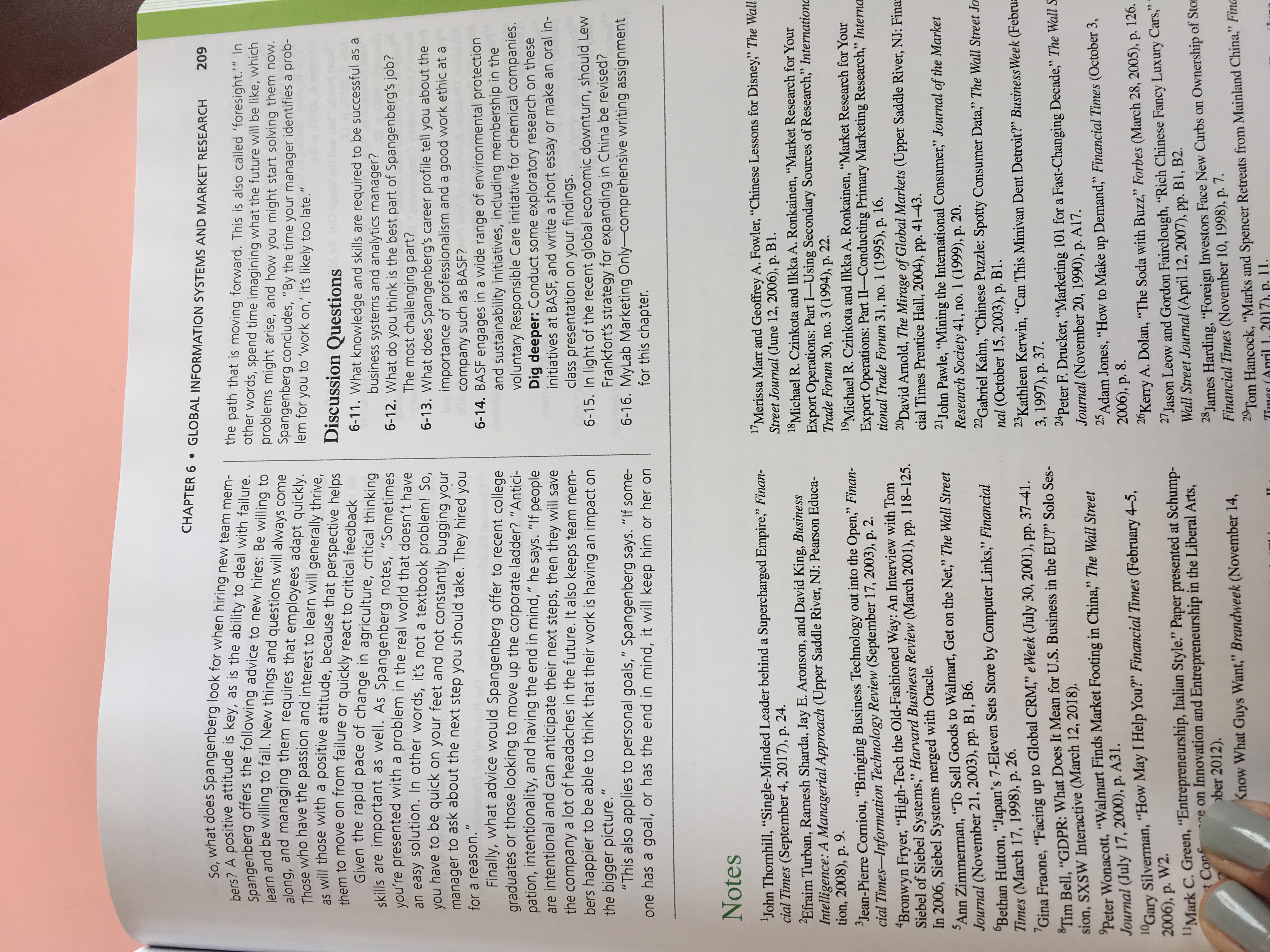Hi I need help with solving this questions. It would be nice using your own words thx
Oh right, I only need the answers 6-10,11,12,13,14 you can skip the other two :)
CHAPTER 6 . GLOBAL INFORMATION SYSTEMS AND MARKET RESEARCH 207 CASE 6-2 A Day in the Life of a Business Systems and Analytics Manager Brady Spangenberg leads a team that oversees the critical business information technology (IT) systems, transaction and customer control in almond orchards. That is what makes Spangenberg's job both data, business intelligence reporting, and strategic analytics for the U.S. fun and challenging at the same time. One day, he and his team are for- sales organization of BASF Agricultural Solutions. Headquartered in matting county-level data about California almond acreage. (Fun fact: Ludwigshafen, Germany, BASF is one of the world's largest integrated Approximately 80 percent of the world's almond supply is produced in chemical manufacturers and suppliers. With approximately 114,000 California's Central Valley.) The next day they are updating counts of employees in more than 80 countries, BASF supplies chemistry-based independent and co-op chemical retailers across the Midwest. products and solutions to business partners in nearly every part of The customer base is as complex as U.S. agriculture itself, compris- the world. BASF's global advertising tagline, "We create chemistry," ing vastly different crops, cropping systems, distribution channels (some highlights the corporate mission to combine economic success with consisting of two steps, others including three steps), and grower enti- environmental protection and social responsibility. ties (corporate versus individual owned and operated). Another fun Based in BASF Agricultural Solutions Headquarters in Research fact: The United States had 318.2 million acres of farmland in produc- Triangle Park, North Carolina, Spangenberg and his team focus pri- tion in 2017, and experts predict that by 2019 soybeans will have marily on supporting the company's U.S. agriculture product portfolio. surpassed corn as the number 1 crop by acreage. The Agricultural Solutions division has something to offer nearly every The Business Systems and Analytics team relies on structured cus- grower and farming operation in America. Examples of key brands and tomer hierarchies and market segmentation strategies to help the BASF uses include Armezon Pro herbicide for early season weed control in Agricultural Solutions organization make sense of historical trends, cur- rent sales activities, and potential future opportunities. The work is corn (see Exhibit 6-7), Priaxor fungicide for foliar ("leaf-related") dis- structured into three main pillars and follows a path that starts with ease control in soybeans and cotton, and even Nealta miticide for mite data cleaning and ends with delivering insights and predictions: Exhibit 6-7 BASF's Armezon Pro herbicide for early season weed control in corn is one of the products Spangenberg's customers rely on. Source: BASF Corporation. Take care of your corn. And it'll take care of you. Verdict red by Kixor Herbic Armezon PRO Headline AMP ungicicle You're trying to squeeze every ounce of yield poten it out of every com acre. That's exactly what the BASE Com POR as built to do: from weed control options that stop yield-robbing weeds tracks to a fungicide that has proven time after time, year after year ad and shoulders above the rest. Add the right people into the mix products, and you've got the winning formula. with your BASF rep today. GrowSmartCorn.com - BASF Grow Smart with BASF We create chemistry Of BASE 6 2017 BASF Corporation. All rights reserved APN 17-GB- code208 PART 3 . APPROACHING GLOBAL MARKETS Improved business tools for improved understanding, greater efficiency and better insights Analytics Customer Knowledge Reporting Center Improve business agility Improve business steering through insightful analytics Improve business predictability through better, through more standardized, and guidance cleaner data repeatable reporting In a role like Spangenberg's, it's not a cliche to say that every work- lives, yet they were also, at times, some of the most frustrating and day is different, presenting new challenges and opportunities. The most secluded. For anyone considering the possibility of working abroad, difficult aspect is figuring out how to balance managing the day-to-day Spangenberg offers some practical advice based on his five-plus years' operational tasks-such as verifying third-party-reported point-of-sale experience : transactions-with longer-term strategic work such as 10-year market forecasting. While both activity types have significant data and ana- . Financial basics: Make sure you (or your company) have plans in lytics components, they also require a substantial amount of human place for your banking, taxes (your home country and host country of residence), currency exchange, credit, and insurance (health, life, intervention and finesse. "Data problems are actually people problems first, " Spangenberg liability). says. "Solving an IT infrastructure issue or analytics request means that . Language skills for all the "little" situations: Most of your cowork- we have to understand the people using that information first. What ers and other professionals (e.g., doctors, bankers, managers) will are their priorities and their concerns? What are they trying to accom- speak and understand English, but don't assume the same for polish? Once we know those things, we can more quickly and easily the Internet/telecommunications installer, office IT support, gym provide a solution." manager, doctor's receptionist, apartment custodian, or hairstylist. That's where Spangenberg relies on his academic training in the Knowing enough of the target language to get by in these little humanities. He earned a BA degree in English and religion from a situations goes a long way toward your overall enjoyment and sat- small liberal arts college in the Midwest and then went on to complete isfaction abroad. It also helps you build rapport with host country MA and PhD degrees in comparative literature at Purdue University nationals, because they see you have made the effort to "meet in West Lafayette, Indiana. With that type of training, Spangenberg's them halfway" by working on your language skills. most logical career path would have been to become a college profes- sor. Although he pursued that angle for a time, he also remembers, . Company culture and networking: Go out of your way to meet "I always had this voice in my head saying, 'What if this literature people in the company and around town. Ask what they do, how professor thing doesn't work out? What skills do I have to support me to be successful, how to avoid pitfalls and faux pas, and which and my family?"" activities they enjoy in their free time. Remember that you are the That nagging concern drove him to continuously work on his outsider" in these situations, so the longer you wait for others to "professional hedges"-namely, those skills and job opportunities come talk to you, the more isolated you'll start to feel. that could differentiate him in a crowded marketplace. As part of that quest, he sought to improve all the "basics" that he learned during his At the end of the day, Spangenberg found that working abroad high school and undergraduate studies. presents many of the same opportunities and challenges as working at As a college student, Spangenberg audited German 101 and home. The best advice he ever received became something of a family German 102 and spent the summers after his junior and senior years motto: "When you're at home, you dream of adventure; when you're studying at language institutes in Germany. After finishing his under- on an adventure, you dream of home." graduate studies, he earned two graduate degrees in comparative lit- No matter where in the world the job position is located, Spangen- erature at Purdue University and also spent an exchange year at the berg has found some commonalities in regard to the nature of work Albert Ludwig University of Freiburg. and employee expectations, which he now includes as agenda items Throughout his post-graduate education, Spangenberg continued for monthly team meetings. Take creativity, for example. As automa- to refine his German language skills, tutored at the Purdue Writing tion becomes increasingly prevalent in agriculture and other industry Center (home of the well-known Purdue Online Writing Lab), learned sectors, it is incumbent on every employee to produce more creative business communication, studied abroad, tried his hand (unsuccess- solutions and strategies to stay ahead of the curve. This principle has fully) at stock market investing, contributed to digital projects and an inverse as well: Which operational, mundane tasks can be auto- blogs, threw himself into grammar and rhetoric, and even applied for mated or delegated? As Spangenberg says, "We need to be creative a Fulbright Scholarship ("Rejected!"). Those elements, diverse as they enough to look for solutions but also self-assured enough to start mov- were, made him ready for the day when a friend recommended that ng things off our plate." he apply for a global communications position with BASF Agricultural Solutions in Germany. Communication is also critically important. Spangenberg con- tinues, "If you can't communicate your analysis, problem, or subject Including his studies, Spangenberg has spent nearly five years matter, then you won't capture-or hold-anyone's attention. Com- living and working abroad in Germany. Those experiences became some of the most exciting and adventurous of his and his family's munication goes beyond writing or speaking skills. It's really the ability to decide-often on the fly-how to structure and present an argu- ment, concept, or need."So, what does Spangenberg look for when hiring new team mem- CHAPTER 6 . GLOBAL INFORMATION SYSTEMS AND MARKET RESEARCH 209 bers? A positive attitude is key, as is the ability to deal with failure. spangenberg offers the following advice to new hires: Be willing to the path that is moving forward. This is also called 'foresight.'" In learn and be willing to fail. New things and questions will always come other words, spend time imagining what the future will be like, which along, and managing them requires that employees adapt quickly. problems might arise, and how you might start solving them now. Those who have the passion and interest to learn will generally thrive, Spangenberg concludes, "By the time your manager identifies a prob- as will those with a positive attitude, because that perspective helps lem for you to 'work on,' it's likely too late." them to move on from failure or quickly react to critical feedback Discussion Questions Given the rapid pace of change in agriculture, critical thinking skills are important as well. As Spangenberg notes, "Sometimes 6-11. What knowledge and skills are required to be successful as a business systems and analytics manager? you're presented with a problem in the real world that doesn't have 6-12. What do you think is the best part of Spangenberg's job? an easy solution. In other words, it's not a textbook problem! So, The most challenging part? you have to be quick on your feet and not constantly bugging your 6-13. What does Spangenberg's career profile tell you about the manager to ask about the next step you should take. They hired you for a reason." mportance of professionalism and a good work ethic at a company such as BASF? Finally, what advice would Spangenberg offer to recent college 6-14. BASF engages in a wide range of environmental protection graduates or those looking to move up the corporate ladder? "Antici- and sustainability initiatives, including membership in the pation, intentionality, and having the end in mind," he says. "If people voluntary Responsible Care initiative for chemical companies. are intentional and can anticipate their next steps, then they will save Dig deeper: Conduct some exploratory research on these the company a lot of headaches in the future. It also keeps team mem- nitiatives at BASF, and write a short essay or make an oral in- bers happier to be able to think that their work is having an impact on class presentation on your findings. the bigger picture." 6-15. In light of the recent global economic downturn, should Lew This also applies to personal goals, " Spangenberg says. "If some- Frankfort's strategy for expanding in China be revised? one has a goal, or has the end in mind, it will keep him or her on 6-16. MyLab Marketing Only-comprehensive writing assignment for this chapter. Notes John Thornhill, "Single-Minded Leader behind a Supercharged Empire," Finan- 17Merissa Marr and Geoffrey A. Fowler, "Chinese Lessons for Disney," The Wall cial Times (September 4, 2017), p. 24. Street Journal (June 12, 2006), p. BI. 2Efraim Turban, Ramesh Sharda, Jay E. Aronson, and David King, Business 18 Michael R. Czinkota and Ilkka A. Ronkainen, "Market Research for Your Intelligence: A Managerial Approach (Upper Saddle River, NJ: Pearson Educa- Export Operations: Part I-Using Secondary Sources of Research," Internation tion, 2008), p. 9. Trade Forum 30, no. 3 (1994), p. 22. Jean-Pierre Corniou, "Bringing Business Technology out into the Open," Finan- 9Michael R. Czinkota and IIkka A. Ronkainen, "Market Research for Your cial Times-Information Technology Review (September 17, 2003), p. 2. Export Operations: Part II-Conducting Primary Marketing Research," Interno Bronwyn Fryer, "High-Tech the Old-Fashioned Way: An Interview with Tom tional Trade Forum 31, no. 1 (1995), p. 16. Siebel of Siebel Systems," Harvard Business Review (March 2001), pp. 118-125. 20David Arnold, The Mirage of Global Markets (Upper Saddle River, NJ: Fina In 2006, Siebel Systems merged with Oracle. cial Times Prentice Hall, 2004), pp. 41-43. Ann Zimmerman, "To Sell Goods to Walmart, Get on the Net," The Wall Street 21 John Pawle, "Mining the International Consumer," Journal of the Market Journal (November 21, 2003), pp. Bl, B6. Research Society 41, no. 1 (1999), p. 20. Bethan Hutton, "Japan's 7-Eleven Sets Store by Computer Links," Financial 2Gabriel Kahn, "Chinese Puzzle: Spotty Consumer Data," The Wall Street Jo Times (March 17, 1998), p. 26. nal (October 15, 2003), p. BI. Gina Fraone, "Facing up to Global CRM," e Week (July 30, 2001), pp. 37-41. 3Kathleen Kerwin, "Can This Minivan Dent Detroit?" Business Week (Febru Tim Bell, "GDPR: What Does It Mean for U.S. Business in the EU?" Solo Ses- 3, 1997), p. 37. sion, SXSW Interactive (March 12, 2018). 24Peter F. Drucker, "Marketing 101 for a Fast-Changing Decade," The Wall "Peter Wonacott, "Walmart Finds Market Footing in China," The Wall Street Journal (November 20, 1990), p. A17. Journal (July 17, 2000), p. A31. 25 Adam Jones, "How to Make up Demand," Financial Times (October 3, 10 Gary Silverman, "How May I Help You?" Financial Times (February 4-5, 2006), p. 8. 2006), p. W2. 26 Kerry A. Dolan, "The Soda with Buzz," Forbes (March 28, 2005), p. 126. 1Mark C. Green, "Entrepreneurship, Italian Style." Paper presented at Schump- 27 Jason Leow and Gordon Fairclough, "Rich Chinese Fancy Luxury Cars," t Cont re on Innovation and Entrepreneurship in the Liberal Arts, Wall Street Journal (April 12, 2007), pp. BI, B2. ober 2012). 28 James Harding, "Foreign Investors Face New Curbs on Ownership of Sto Know What Guys Want," Brandweek (November 14, Financial Times (November 10, 1998), p. 7. 29Tom Hancock, "Marks and Spencer Retreats from Mainland China," Fin









